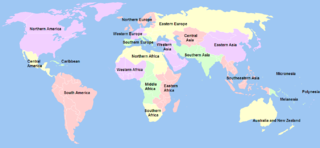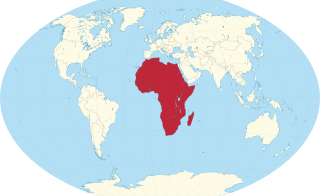Related Research Articles

Sub-Saharan Africa or Subsahara is the area and regions of the continent of Africa that lie south of the Sahara. These include Central Africa, East Africa, Southern Africa, and West Africa. Geopolitically, in addition to the African countries and territories that are situated fully in that specified region, the term may also include polities that only have part of their territory located in that region, per the definition of the United Nations (UN). This is considered a non-standardised geographical region with the number of countries included varying from 46 to 48 depending on the organisation describing the region. The African Union (AU) uses a different regional breakdown, recognising all 55 member states on the continent—grouping them into five distinct and standard regions.

In international relations, regional power, since the late 20th century, has been used for a sovereign state that exercises significant power within its geographical region. States that wield unrivaled power and influence within a region of the world possess regional hegemony.

Europe, the Middle East and Africa, commonly known by its acronym EMEA among the North American business spheres, is a geographical region used by institutions, governments and global spheres of marketing, media and business when referring to this region. The acronym EMEA is a shorthand way of referencing the two continents and the Middle Eastern sub-continent all at once.

A subregion is a part of a larger geographical region or continent. Cardinal directions are commonly used to define subregions. There are many criteria for creating systems of subregions; this article is focusing on the United Nations geoscheme, which is a changing, constantly updated, UN tool based on specific political geography and demography considerations relevant in UN statistics.

The Westminster Foundation for Democracy (WFD) is a United Kingdom non-departmental public body set up to support democratic institutions overseas. It was established on 26 February 1992 and registered as a company limited by guarantee in the UK. It receives funding from the Foreign, Commonwealth and Development Office (FCDO).

The global pandemic of HIV/AIDS began in 1981, and is an ongoing worldwide public health issue. According to the World Health Organization (WHO), by 2023, HIV/AIDS had killed approximately 40.4 million people, and approximately 39 million people were infected with HIV globally. Of these, 29.8 million people (75%) are receiving antiretroviral treatment. There were about 630,000 deaths from HIV/AIDS in 2022. The 2015 Global Burden of Disease Study estimated that the global incidence of HIV infection peaked in 1997 at 3.3 million per year. Global incidence fell rapidly from 1997 to 2005, to about 2.6 million per year. Incidence of HIV has continued to fall, decreasing by 23% from 2010 to 2020, with progress dominated by decreases in Eastern Africa and Southern Africa. As of 2023, there are about 1.3 million new infections of HIV per year globally.

The population of Africa has grown rapidly over the past century and consequently shows a large youth bulge, further reinforced by increasing life expectancy in most African countries. Total population as of 2024 is about 1.5 billion, with a growth rate of about 100 million every three years. The total fertility rate for Africa is 4.1 as of 2024, the highest in the world. The most populous African country is Nigeria with over 206 million inhabitants as of 2020 and a growth rate of 2.6% p.a.
Viacom International Inc. is the international division of the Paramount Media Networks subsidiary of Paramount Global that oversees the production, broadcasting and promotion of its brands outside of the United States. These brands include Paramount Network, Comedy Central, MTV, Nickelodeon and BET, as well as CBS-branded channels co-owned with AMC Networks International. PIN also owned a 30% stake in the Rainbow S.p.A. animation studio in Italy from 2011 to 2023 and a stake in Viacom18, an Indian joint venture with domestic partner TV18, from 2007 to 2024.

The Human Rights Tulip is an annual prize awarded by the Dutch ministry of Foreign Affairs to a human rights defender or organisation who promotes and supports human rights in innovative ways. The Human Rights Tulip was established in 2007 and presented for the first time on 10 December 2008 and designed by the artist duo Adelheid and Huub Kortekaas.

During the period of 1965 – 2021, an estimated 440,000 people per year emigrated from Africa; a total number of 17 million migrants within Africa was estimated for 2005. The figure of 0.44 million African emigrants per year pales in comparison to the annual population growth of about 2.6%, indicating that only about 2% of Africa's population growth is compensated for by emigration.
Jesuit Conferences are groupings of administrative divisions of the Society of Jesus. These Provinces and Regions are organized into a conference to promote common goals and oversee international projects. A Conference connects Jesuits across the region for mutual solidarity and corporate international initiatives, and facilitates appropriate engagement in regional needs, and greater cooperation and support among its members. A Conference provides liaison staffing in the provinces, in various national associations, and at the Society’s international headquarters in Rome. A president, appointed by the Superior General, oversees the work of the Jesuit Conference.

Vandana Luthra is an Indian entrepreneur and the founder of VLCC Health Care Ltd, a beauty and wellness conglomerate represented in Asia, the GCC and Africa. She is also the chairperson of the Beauty & Wellness Sector Skill Council (B&WSSC), an initiative that provides training under the Pradhan Mantri Kaushal Vikas Yojana schemes.

Bilikiss Adebiyi or Bilikiss Adebiyi-Abiola is a Nigerian entrepreneur who founded the Lagos-based recycling company 'Wecyclers'. In 2022 she was the Director General of the Lagos State Records and Archives Bureau (LASRAB) and Managing Director of the Lagos State Parks and Gardens Agency (LASPARK). She was a member of the Board of Trustees of the Lagos State Employment Trust Fund.
Achenyo Idachaba is an American-born entrepreneur working in Nigeria. She won the Cartier Initiative Award for women in Sub-Saharan Africa in 2014. Her TED talk had over 1.8 million views as of 2020.
Diana Jue-Rajasingh is an American female activist who is promoting life-improving technologies in South India. She has established the Essmart network in association with Jackie Stenson, whom she met while at MIT, to disseminate technology innovations which are largely unknown in the rural areas of India and China. Through this network of community initiatives she and her friend created distribution channels. In 2015, Forbes named Jue-Rajasingh as "one of Forbes' 30 under 30." In 2016, Jue-Rajasingh entered the Strategy doctoral program at the University of Michigan Ross School of Business.
Chinwe Ohajuruka is a green Architect born in Nigerian. She divides her time between Nigeria and the United States for projects. She became the Sub-Saharan African Laureate for the Cartier Women's Initiative Awards in France in 2015 for her contribution in affordable green houses and social entrepreneurship.
Kresse Anne-Marie WeslingCBE is a Canadian-born British entrepreneur and co-founder of the luxury recycled accessories company Elvis and Kresse. She has been a visiting professor at the University of Oxford's Said Business School.
Warner Bros. Discovery International, formerly known as Turner Broadcasting System International and WarnerMedia International, is an international unit of Warner Bros. Discovery led by president Gerhard Zeiler. The division oversees the production, broadcasting and promotion of key WBD brands outside of the United States. These brands include Adult Swim, Animal Planet, Boomerang, Cartoon Network, Discovery Channel, HBO, TLC, TBS, TNT, and Warner TV, as well as Polish owned TVN Group channels and has a stake of some networks operated by CTV Speciality Television Inc., a joint venture between Bell Media and ESPN Inc. such as Discovery and Animal Planet.
Lorna Rutto is a Kenyan ecopreneur, and founder of Ecopost, a social enterprise that manufactures fencing posts and other products from recycled plastic waste in offering sustainable jobs to people in marginalized communities and solutions to Kenya's plastic waste challenge.
References
- ↑ "Science & Technology Pioneer Award | Cartier Women's Initiative". www.cartierwomensinitiative.com. Retrieved 19 September 2024.
- ↑ "Diversity, Equity & Inclusion Award | Cartier Women's Initiative". www.cartierwomensinitiative.com. Retrieved 19 September 2024.
- ↑ "About Us". www.cartierwomensinitiative.com. Retrieved 19 September 2024.
- 1 2 3 4 5 6 7 8 9 10 11 12 "The 2014 Edition". Cartier Women's Initiative Awards. Retrieved 29 October 2015.
- 1 2 3 4 5 6 "The 2013 Edition". Cartier Women's Initiative Awards. Archived from the original on 24 February 2016. Retrieved 28 February 2016.
- ↑ "Cécile Réal". Cartier Women's Initiative Awards. Retrieved 28 October 2015.
- ↑ "Gabriela Flores". Cartier Women's Initiative Awards. Retrieved 28 October 2015.
- ↑ "Iba Masood". Cartier Women's Initiative Awards. Retrieved 28 October 2015.
- ↑ "Ting Shih". Cartier Women's Initiative Awards. Retrieved 28 October 2015.
- ↑ "Julienne Ingabire & Elizabeth Scharpf". Cartier Women's Initiative Awards. Retrieved 28 October 2015.
- ↑ "Chunhong Chen". Cartier Women's Initiative Awards. Retrieved 28 October 2015.
- ↑ "Kresse Wesling". Cartier Women's Initiative Awards. Retrieved 28 October 2015.
- ↑ "Carolina Guerra". Cartier Women's Initiative Award. Retrieved 28 October 2015.
- ↑ "Rana El Chemaitelly". Cartier Women's Initiative Awards. Retrieved 28 October 2015.
- ↑ "Benita Singh & Summer Rayne Oakes". Cartier Women's Initiative Awards. Retrieved 28 October 2015.
- ↑ "Lorna Rutto". Cartier Women's Initiative Awards. Retrieved 28 October 2015.
- ↑ "Ann Kihengu". Cartier Women's Initiative Awards. Retrieved 28 October 2015.
- ↑ "Gouthami". Cartier Women's Initiative Awards. Retrieved 28 October 2015.
- ↑ "Wendy McMillan". Cartier Women's Initiative Awards. Retrieved 28 October 2015.
- ↑ "Valentina Peroni". Cartier Women's Initiative Awards. Retrieved 28 October 2015.
- ↑ "Birame Sock". Cartier Women's Initiative Awards. Retrieved 28 October 2015.
- ↑ "Jife Williams & Adeola Asabia". Cartier Women's Initiative Awards. Retrieved 28 October 2015.
- ↑ "Kimberly Ong". Cartier Women's Initiative Awards. Retrieved 28 October 2015.
- ↑ "Halla Tómasdóttir & Kristin Pétursdóttir". Cartier Women's Initiative Awards. Retrieved 28 October 2015.
- ↑ "Rosario Monteverde & Magdalena Rodriguez". Cartier Women's Initiative Awards. Retrieved 28 October 2015.
- ↑ "Una Ryan". Cartier Women's Initiative Award. Archived from the original on 19 August 2019. Retrieved 28 October 2015.
- ↑ "Mame Diene". Cartier Women's Initiative Awards. Retrieved 28 October 2015.
- ↑ "Renee King". Cartier Women's Initiative Awards. Retrieved 28 October 2015.
- ↑ "Laura Chicurel". Cartier Women's Initiative Awards. Retrieved 28 October 2015.
- ↑ "Cynthia Guy". Cartier Women's Initiative Awards. Retrieved 28 October 2015.
- ↑ "Mona S. Jhaveri". Cartier Women's Initiative Awards. Retrieved 28 October 2015.
- ↑ "Lucie Avoaka". Cartier Women's Initiative Awards. Retrieved 28 October 2015.
- ↑ "Nandini Pandhi". Cartier Women's Initiative Awards. 4 May 2011. Archived from the original on 14 March 2016. Retrieved 28 October 2015.
- ↑ "M. Yasmina McCarty". Echoing Green. Retrieved 28 October 2015.
- ↑ "Bettina Gotzenberger". Cartier Women's Initiative Awards. Retrieved 28 October 2015.
- ↑ "Antonia Sanin". Cartier Women's Initiative Awards. Retrieved 28 October 2015.